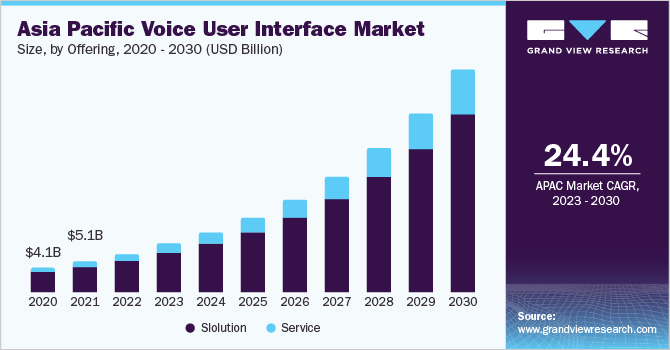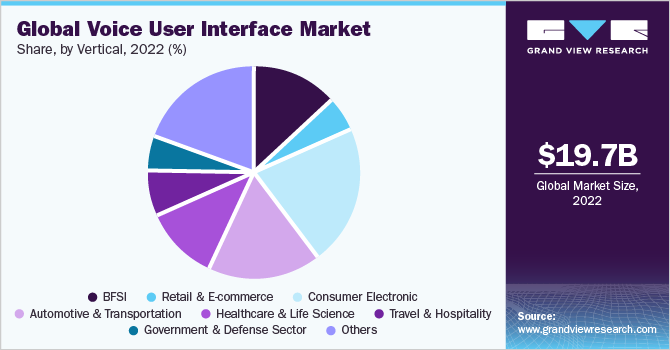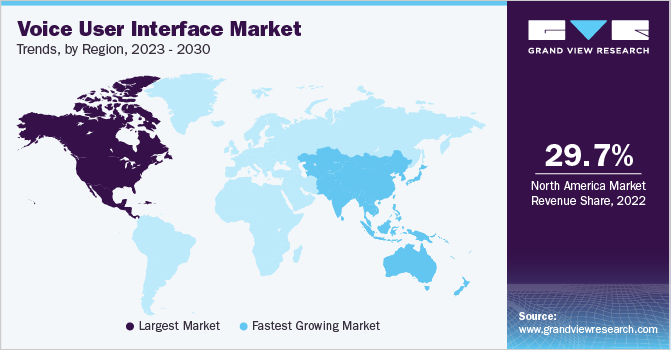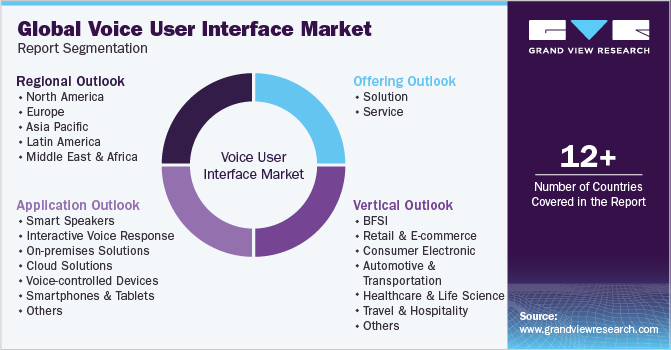- Home
- »
- Next Generation Technologies
- »
-
Voice User Interface Market Size And Share Report, 2030GVR Report cover
![Voice User Interface Market Size, Share & Trends Report]()
Voice User Interface Market Size, Share & Trends Analysis Report By Offering, By Application (Smart Speakers, Interactive Voice Response, On-premise Solutions), By Industry Vertical, By Region, And Segment Forecast, 2023 - 2030
- Report ID: GVR-4-68040-122-0
- Number of Report Pages: 100
- Format: PDF, Horizon Databook
- Historical Range: 2017 - 2021
- Forecast Period: 2023 - 2030
- Industry: Technology
Report Overview
The global voice user interface market size was estimated at USD 19.73 billion in 2022 and is expected to grow at a compound annual growth rate (CAGR) of 21.3% from 2023 to 2030.The market is expected to grow due to the continuous development and advancement of artificial intelligence (AI) and natural language processing (NLP) capabilities; these technologies have significantly enhanced the accuracy and understanding of Voice User Interface (VUI). These advancements have made voice interactions more reliable and context-aware, improving user experience.

Voice user interface devices offer a more natural and effortless way for users to interact with technology. Voice commands allow users to perform tasks, access information, and control devices without needing physical input, making it convenient and user-friendly. The growing number of smart devices, including smart speakers, smartphones, smartwatches, and in-car voice assistants, has expanded the use cases for voice user interface. Voice interactions have become integrated into many everyday devices, making voice user interfaces more accessible to consumers.
The integration of the Internet of Things (IoT) with VUI has opened up many new possibilities and use cases. The combination of IoT and VUI technologies enables seamless voice control and interaction with a wide range of connected devices, making our lives more convenient and efficient. IoT devices such as smart thermostats, smart lighting, smart locks, and smart appliances can be controlled and monitored using voice commands. Users can adjust the temperature, turn on/off lights, lock doors, and manage home devices hands-free. Moreover, the integration of the IoT with VUI not only enhances user experience but also enables a more interconnected and automated world. As technology advances, innovative IoT and VUI Verticals will continue to expand, shaping the future of smart homes, cities, and industries.
The rise of voice commerce has created new revenue opportunities for businesses. Users can make purchases, place orders, and perform transactions using voice commands, simplifying the buying process and increasing consumer engagement. Enterprises have recognized the potential of VUIs for streamlining business processes, improving customer support, and enhancing productivity. The integration of VUIs in business Verticals has driven growth in the enterprise segment of the market. Moreover, continuous improvements in VUI design and user experience have made voice interactions more intuitive and engaging. VUIs have become better at understanding natural language, providing relevant responses, and adapting to users’ preferences.
Offering Insights
The solution segment dominated the market with a revenue share of 82.3% in 2022. As the demand for VUI technology continues to grow, new solution segments and advancements in existing technologies are likely to emerge. The VUI market is evolving rapidly, and companies are continually innovating to improve voice-enabled Verticals' accuracy, naturalness, and overall performance. The solution segment includes automatic speech recognition, natural language processing, text-to-speech, voice biometrics, voice analytics, and others.
The services segment of the Voice User Interfaces (VUI) market has experienced significant growth and is expected to continue expanding in the coming years. Services play a crucial role in successfully implementing and deploying VUI solutions, and businesses often seek external expertise to ensure the development, integration, and maintenance of voice-enabled Verticals. The widespread adoption of smart speakers, virtual assistants, and voice-enabled devices has driven the demand for services related to VUI technology. Businesses and consumers alike are recognizing the value of voice interactions, leading to a surge in demand for VUI implementation services.
Application Insights
The smartphones and tablets segment dominated the market, with a revenue share of 24.6% in 2022. Smartphones and tablets are one of the most significant and rapidly growing areas. Smartphones and tablets are ubiquitous devices that have become an integral part of people's daily lives, and the integration of VUI technology has transformed how users interact with these devices. Voice assistants are at the core of the smartphones and tablets segment. Major mobile operating systems, such as Apple's iOS (with Siri) and Google's Android (with Google Assistant), have built-in voice assistants that enable users to perform tasks using voice commands. Voice assistants can answer questions, set reminders, send messages, make calls, and perform various functions, all through natural language interactions.
The other segment is expected to grow with the fastest CAGR from 2023 to 2030. The other segment includes smart home devices, automotive infotainment, customer service, and virtual assistants. Voice-controlled smart home devices like smart speakers, smart thermostats, smart lighting, and smart locks have become increasingly popular. Users can control these devices and manage their home environment through voice commands, providing convenience and seamless integration. Moreover, many modern cars come equipped with voice-controlled infotainment systems, allowing drivers to control media, navigation, and other functions while keeping their hands on the wheel and eyes on the road.
Vertical Insights
The consumer electronics segment dominated the voice user interface market, with a revenue share of 20.8% in 2022. The segment is experiencing significant growth, which is expected to continue in the coming years. Integrating voice technology into consumer electronics has been a major driver of innovation and improved user experiences. For example, Voice assistants like Siri (Apple), Google Assistant (Google), and Bixby (Samsung) are integrated into smartphones and tablets, providing users with voice-based access to various Verticals, services, and device functions.

The other segment refers to using VUIs in various industries and professional settings. Voice user interfaces in the media & entertainment, IT & telecommunication, and commercial sectors have been on the rise, driven by the need for enhanced user experiences, improved productivity, and seamless interactions. For example, VUIs are integrated into media streaming services and smart TVs, allowing users to search for and access content through voice commands. Users can control playback, search for specific shows or movies, and adjust the volume hands-free.
Regional Insights
North America dominated the market with a revenue share of 29.7% in 2022. The United States and Canada were this region's primary growth drivers. North America is one of the leading regions in the VUI market. The presence of major technology companies like Amazon.com, Inc.; Google LLC; and Apple Inc. contributed to the widespread adoption of voice-enabled devices. These companies had released smart speakers and other devices that supported voice interactions.

The European countries also experienced significant growth in the market. The adoption of smart home devices, including voice-enabled speakers, thermostats, and smart appliances, contributed to the expansion of the regional market. Countries like the United Kingdom, Germany, and France were among the leaders in adopting voice technology.
The Asia Pacific region is expected to grow at the fastest CAGR of 24.4 % from 2023 to 2030. Asia Pacific is witnessing significant growth due to rapid technological advancements and the presence of major manufacturing hubs. Countries like China, Japan, and South Korea were investing in voice technology and AI-driven products. Additionally, the increasing use of smartphones and the integration of voice assistants into various Verticals contributed to the market growth in this region.
Key Companies & Market Share Insights
The market is characterized by strong competition, with a few major worldwide competitors owning a significant market share. The major focus is developing new products and collaborating among the key players. Some prominent players in the global voice user interface market include:
-
Amazon, Inc.
-
Apple, Inc.
-
Baidu, Inc.
-
Google LLC
-
IBM
-
Meta Platform, Inc.
-
Nuance Communication
-
SAMSUNG
-
SoundHound AI Inc.
-
Speechly
Voice User Interface Market Report Scope
Report Attribute
Details
Market size value in 2023
USD 23.94 billion
Revenue forecast in 2030
USD 92.41 billion
Growth rate
CAGR of 21.3% from 2023 to 2030
Base year for estimation
2022
Historical data
2017 - 2021
Forecast period
2023 - 2030
Quantitative units
Market revenue in USD million/billion, CAGR from 2023 to 2030
Report Coverage
Revenue forecast, company ranking, competitive landscape, growth factors, trends
Segments Covered
Offering, application, vertical, region
Regional scope
North America; Europe; Asia Pacific; Latin America; MEA
Country scope
U.S.; Canada; Mexico; UK; Germany; France; China; India; Japan; Australia; South Korea; Kingdom of Saudi Arabia; UAE; South Africa; Brazil
Key companies profiled
Amazon, Inc.; Apple, Inc.; Baidu, Inc.; Google LLC; IBM; Meta Platform, Inc.; Nuance Communication; SAMSUNG; SoundHound AI Inc.; Speechly
Customization scope
Free report customization (equivalent up to 8 analysts working days) with purchase. Addition or alteration to country, regional, and segment scope.
Global Voice User Interface Market Report Segmentation
This report forecasts revenue growth on global, regional, and country levels and analyzes the latest industry trends in each of the sub-segments from 2017 to 2030. For this study, Grand View Research has segmented the global voice user interface market report based on offering, application, vertical, and region:

-
Offering Outlook (Revenue, USD Million, 2017 - 2030)
-
Solution
-
Service
-
-
Application Outlook (Revenue, USD Million, 2017 - 2030)
-
Smart Speakers
-
Interactive Voice Response
-
On-premises Solutions
-
Cloud Solutions
-
Voice-controlled Devices
-
Smartphones & Tablets
-
Others
-
-
Vertical Outlook (Revenue, USD Million, 2017 - 2030)
-
BFSI
-
Retail & E-commerce
-
Consumer Electronic
-
Automotive & Transportation
-
Healthcare & Life Science
-
Travel & Hospitality
-
Government & Defense Sector
-
Others
-
-
Regional Outlook (Revenue, USD Million, 2017 - 2030)
-
North America
-
U.S.
-
Canada
-
-
Europe
-
UK
-
Germany
-
France
-
-
Asia Pacific
-
China
-
India
-
Japan
-
South Korea
-
Australia
-
-
Latin America
-
Brazil
-
Mexico
-
-
Middle East and Africa
-
KSA
-
UAE
-
South Africa
-
-
Frequently Asked Questions About This Report
b. The global voice user interface market size was estimated at USD 19.73 billion in 2022 and is expected to reach USD 23.94 billion in 2023.
b. The global voice user interface market is expected to grow at a compound annual growth rate of 21.3% from 2023 to 2030 to reach USD 92.41 billion by 2030.
b. North America dominated the voice user interface market with a share of 29.7% in 2022. This is attributable to the region actively contributing to advancements in speech recognition, natural language processing, and AI-driven voice interactions. Also, the presence of major technology companies like Amazon.com, Inc, Google LLC, and Apple Inc., contributed to the widespread adoption of voice-enabled devices.
b. Some key players operating in the voice user interface market include Amazon, Inc., Apple, Inc., Baidu, Inc., Google LLC, IBM, Meta Platform, Inc., Nuance Communication, SAMSUNG, SoundHound AI Inc., Speechly
b. Key factors driving the voice user interface market growth include the continuous development and advancement of artificial intelligence and natural language processing capabilities; these technologies have significantly enhanced the accuracy and understanding of voice user Interface.
Share this report with your colleague or friend.
![gvr icn]()
NEED A CUSTOM REPORT?
We can customize every report - free of charge - including purchasing stand-alone sections or country-level reports, as well as offer affordable discounts for start-ups & universities. Contact us now
![Certified Icon]()
We are GDPR and CCPA compliant! Your transaction & personal information is safe and secure. For more details, please read our privacy policy.
We are committed towards customer satisfaction, and quality service.
"The quality of research they have done for us has been excellent."





